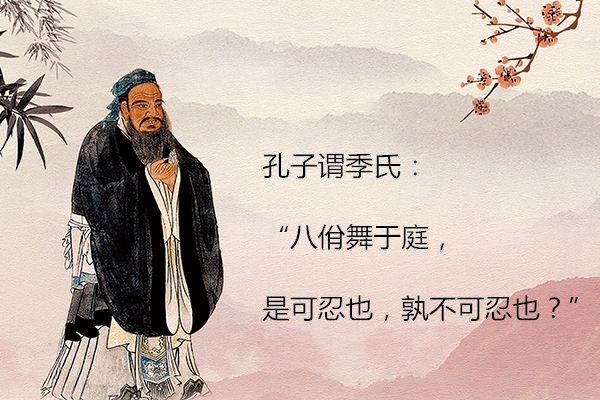Confucius said of the head of the Chi family, who had eight rows of pantomimes in his area, "If he can bear to do this, what may he not bear to do?"
孔子谓季氏:“八佾舞于庭,是可忍也,孰不可忍也?”
The three families used the Yungode, while the vessels were being removed, at the conclusion of the sacrifice.
三家者以《雍》彻。
The Master said, "'Assisting are the princes; the son of heaven looks profound and grave';
子曰:“‘相维辟公,天子穆穆’,
what application can these words have in the hall of the three families?"
奚取于三家之堂?”
The Master said, "If a man be without the virtues proper to humanity, what has he to do with the rites of propriety?
子曰:“人而不仁,如礼何?
If a man be without the virtues, what has he to do with music?"
人而不仁,如乐何?”

Lin Fang asked what was the first thing to be attended to in ceremonies.
林放问礼之本。
The Master said, "A great question indeed! "In festive ceremonies, it is better to be sparing than extravagant.
子曰:“大哉问!礼,与其奢也,宁俭;
In the ceremonies of mourning, it is better that there be deep sorrow than in minute attention to observances."
丧,与其易也,宁戚。”
The Master said, "The rude tribes of the east and north have their princes, and are not like the States of our great land which are without them."
子曰:“夷狄之有君,不如诸夏之亡也。”
The chief of the Chi family was about to sacrifice to the T'ai mountain.
季氏旅于泰山。
The Master said to Zan Yu, "Can you not save him from this?" He answered, "I cannot."
子谓冉有曰:“女弗能救与?”对曰:“不能。”
Confucius said, "Alas! will you say that the T'ai mountain is not so discerning as Lin Fang?"
子曰:“呜呼!曾谓泰山不如林放乎?”


